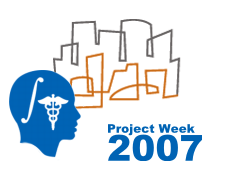Difference between revisions of "Special topic breakout: DWI/DTI"
From NAMIC Wiki
(→Notes) |
|||
| (8 intermediate revisions by 5 users not shown) | |||
| Line 23: | Line 23: | ||
* Wendy Plesniak | * Wendy Plesniak | ||
* John Melonakos | * John Melonakos | ||
| − | + | * Ran Tao | |
| − | Agenda: | + | * Demian Wassermann |
| − | + | ==Agenda== | |
| − | * | + | * Current design and work in progress: what has it been achieved?. |
| − | * | + | ** MRML structure. |
| + | ** Display options. | ||
| + | ** Slicer-matlab interface. | ||
| + | * External applications | ||
| + | ** FiberViewer | ||
| + | * Core interaction modes: What do a DTI study needs from Slicer 3? | ||
** Visualize raw DWI data | ** Visualize raw DWI data | ||
| − | ** Seed regions | + | ** Seed regions. |
| − | ** Display glyphs | + | ** Display glyphs. |
| − | ** | + | ** Scalar measures |
| − | * DWI/DTI to structural registration | + | ** Tensor transformations |
| + | ** ROI-based tractography/connectivity. | ||
| + | ** Stochastic tractography. | ||
| + | ** DWI/DTI to structural registration. | ||
| + | ** Study End-points: tract-based measurements vs. ROI-based measurements. | ||
| + | * New trends: shaping Slicer3 into the future | ||
| + | ** Multiple tensor model: basic design ideas. | ||
| + | ** High angular resolution studies. | ||
| + | ==Notes== | ||
| + | Fiber Viewer stats on fibers may be available this week. | ||
| + | They also have fiber resampling. | ||
Latest revision as of 20:43, 26 June 2007
Home < Special topic breakout: DWI < DTI
Return to Project Week Main Page
DWI/DTI Breakout Session
June 26th, 4-5pm
Location: Grier Rooms A & B: 34-401A & 34-401B
Attendees:
- Katharina
- Marek Kubicki
- Sylvain Bouix
- Raul San Jose
- Lauren O'Donnell
- Marc Niethammer
- Casey Goodlett
- Jim Miller
- Wendy Plesniak
- John Melonakos
- Ran Tao
- Demian Wassermann
Agenda
- Current design and work in progress: what has it been achieved?.
- MRML structure.
- Display options.
- Slicer-matlab interface.
- External applications
- FiberViewer
- Core interaction modes: What do a DTI study needs from Slicer 3?
- Visualize raw DWI data
- Seed regions.
- Display glyphs.
- Scalar measures
- Tensor transformations
- ROI-based tractography/connectivity.
- Stochastic tractography.
- DWI/DTI to structural registration.
- Study End-points: tract-based measurements vs. ROI-based measurements.
- New trends: shaping Slicer3 into the future
- Multiple tensor model: basic design ideas.
- High angular resolution studies.
Notes
Fiber Viewer stats on fibers may be available this week. They also have fiber resampling.